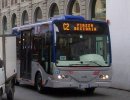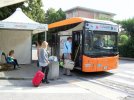TheGrandWazoo
Veteran Member
I don't believe that's correct. They use them on less intensive services - Malta and Slovenia are instances off the top of my head. Here's a a pair of Italian ones (my photos) with a single door vehicle but the other one shows how you can take multiple doors to the extreme.Obviously hardly any developed countries uses single door buses!


The reasons why the UK has fewer dual or multi door vehicles has been covered many, many times on this forum. You have a different commercial model across most of the UK and always have had, compared to mainland Europe, where operators bare the cost of purchase and ongoing maintenance of vehicles. They cost more to buy, more to maintain, and they have a lower capacity. Operators have done the sums and worked out that dwell time improvements DON'T outweigh the costs of maintenance. Or that speed improvements to reduce PVR are negated by loss of capacity. Then there's the hidden cost of fare evasion - not an issue if all you're contracted to do is provide a managed service (such as in London or Manchester).
TOTO can be employed in the UK successfully and is in some places. The issue is consistency - not all operators have moved at the same time so you have it on one operator in a town but not on others so it's not ingrained. Certainly, I see no argument for widespread introduction of roadside ticket machines. Apart from getting trashed, it's another expense in both installation and ongoing maintenance.
I had a spell travelling into Bristol in the peaks about 6 years ago. It was noticeable how many regular punters used pre-paid tickets on smartphones, simply scanning in. The number of cash fares was really small, with m-tickets being pushed and discounted by First under the leadership of James Freeman. Operators don't like cash - it's a headache to deal with (for admin and security reasons) and they like pre-paid tickets as it massively improves cashflow. The £2 fare has actually led to a regression in some respects as it's anecdotally attracted in ad-hoc users who might not have used the bus regularly (so never had weekly passes). However, I'd ask posters to consider this... What would happen NOW if a major city tried to follow London in dispensing with cash. I'd suggest we'd probably see the disciples of Piers Corbyn throw their foil hats in the air, whilst those of Jeremy talk about social exclusion and depriving the poorest of the means of travel.
I know that @Bletchleyite will state that bus companies should minimise the dwell time that is within their control, and I do think that some definitely could. However, I travel on a lot of firms and there are relatively few protracted passenger/driver discussions (and they're often about other things like where does the bus stop, or what time are the return journeys?). Again, my Bristol experience showed me that there's a reason why my peak time journey took 23% longer and it wasn't to do with passenger dwell times/driver interactions (and that was with a dual door bus, I might add).
